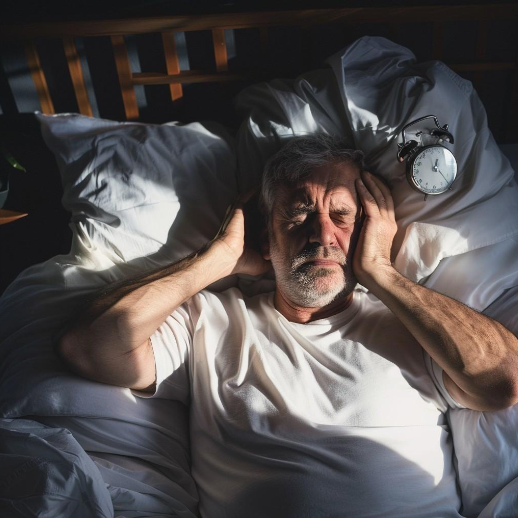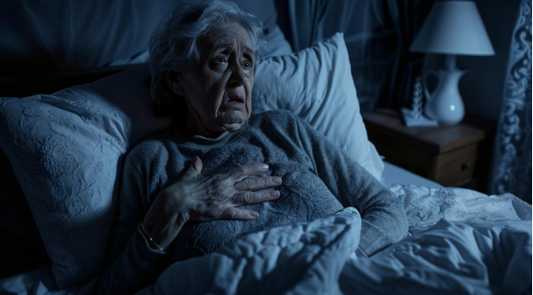Sleep is an essential part of health and well-being, especially for seniors. However, as we age our bodies naturally produce less melatonin which can lead to difficulty falling asleep or staying asleep throughout the night. Melatonin has become a popular supplement among those looking to improve their sleep quality but it's important to understand how this hormone works and what potential side effects may occur from taking it before deciding if it’s right for you. In this blog post, we'll discuss what melatonin is, its benefits when used properly by seniors as a sleep aid, any potential side effects that should be considered beforehand, dosage considerations specific to older adults using melatonin supplements and alternatives available if taking melatonin isn't the best choice for you.
Table of Contents:
- What is Melatonin?
- Benefits of Melatonin
- Side Effects of Melatonin
- Dosage Considerations for Melatonin Use in Seniors
- Alternatives to Taking Melatonin as a Sleep Aid for Seniors
- FAQs in Relation to Melatonin
- Conclusion
What is Melatonin?
Melatonin is a hormone naturally produced by the body that helps regulate sleep and wake cycles. It is released from the pineal gland in response to darkness, helping to promote restful sleep. Melatonin levels typically peak during the night and drop off in the morning as light increases.
Definition of Melatonin:
Melatonin is a hormone found naturally in animals, plants, and microbes that helps regulate circadian rhythms (sleep-wake cycles). It is primarily secreted by the pineal gland located at the base of your brain but can also be found in some foods like tart cherries or walnuts.
Sources of Melatonin:
The primary source of melatonin for humans comes from within our bodies; however, it can also be taken as a supplement or extracted from animal sources such as cows or pigs. In addition, certain plant-based foods contain small amounts of melatonin including oats, barley, rice bran oil, tomatoes, bananas and oranges.
When darkness falls each evening, melatonin production begins increasing until it reaches its peak around midnight when we are usually asleep. As daylight arrives, melatonin production decreases allowing us to become alert again during waking hours. This natural cycle ensures that our bodies are able to get adequate rest throughout each day/night cycle, which allows us to function optimally during waking hours.
Melatonin is a naturally occurring hormone that can help improve sleep quality, reduce stress and anxiety, regulate moods, and support immune system functioning. In this article, we will discuss the potential benefits of taking melatonin supplements for seniors.
Benefits of Melatonin
It’s released by the pineal gland, which is located in the brain. Melatonin levels are highest at night and lowest during daylight hours. As we age, melatonin production decreases, making it more difficult to get quality sleep as we grow older.
Improved Sleep Quality:
Taking melatonin can help seniors achieve better quality of sleep due to its ability to promote relaxation and reduce stress levels before bedtime. Additionally, studies have shown that taking melatonin supplements can improve overall sleep duration and reduce time spent awake during nighttime hours for those with insomnia or other sleeping disorders.
Reduced Stress and Anxiety:
Research has also found that taking melatonin may help lower stress levels by decreasing cortisol (the “stress hormone”) production in the body while increasing serotonin (a neurotransmitter associated with feelings of well-being). This can lead to improved mood regulation and reduced anxiety symptoms over time.
Improved Mood Regulation:
Melatonin has been linked to an improvement in mood regulation due to its effects on serotonin production in the brain. Studies suggest that supplementing with this hormone may be beneficial for those who suffer from depression or anxiety disorders as it helps balance out hormones related to these conditions such as cortisol and dopamine.
Enhanced Immune System Functioning:
Another potential benefit of taking melatonin is enhanced immune system functioning due to its antioxidant properties which protect cells from damage caused by free radicals present in our environment today. Additionally, research suggests that supplementing with this hormone may boost immunity against certain illnesses like colds or flu viruses by helping increase white blood cell count within the body's natural defense system against infection or disease-causing organisms.
Overall, melatonin has a variety of potential benefits for seniors looking to improve their sleep quality. However, it is important to be aware of the possible side effects associated with taking this supplement as well.
Side Effects of Melatonin
It is found in many foods, such as oats, bananas, tomatoes, walnuts, and almonds. While melatonin can be beneficial for improving sleep quality in seniors, it also has some potential side effects that should be taken into consideration before taking this supplement.
Drowsiness and fatigue are common side effects of melatonin use in seniors. This may lead to difficulty concentrating or feeling lethargic during the day. Headaches and dizziness may also occur with melatonin use due to its sedative effect on the body. Digestive issues such as nausea or stomach cramps have been reported by some people who take melatonin supplements regularly.
Low blood pressure and heart rate changes can occur when taking high doses of melatonin over an extended period of time. Seniors should monitor their blood pressure closely while using this supplement to ensure they do not experience any adverse reactions from it. Additionally, interactions between medications or other supplements taken at the same time as melatonin could cause serious health risks if not monitored properly by a doctor or pharmacist familiar with your medical history and current medications/supplements being taken.
Although melatonin is generally considered safe for most people, it can cause a range of side effects that seniors should be aware of. It's important to consider dosage and safety considerations when taking melatonin supplements as a senior. If you're worried about side effects of melatioan our Deep Sleep is an excelant all-natural sleep-aid that does not have any melatoninin it.
Dosage Considerations for Melatonin Use in Seniors
As people age, their melatonin production decreases, making it more difficult to fall asleep and stay asleep. For this reason, many seniors turn to supplemental melatonin as a way to improve their sleep quality. However, there are some important considerations when taking melatonin supplements for senior use.
Recommended Dosages for Seniors:
The recommended dosage of melatonin varies from person to person depending on individual needs and health conditions. Generally speaking, experts recommend starting with the lowest dose possible (0.3 mg) and gradually increasing if needed until desired results are achieved without experiencing any side effects or adverse reactions. It’s also important to note that taking too much can be just as harmful as not enough; therefore it’s best to consult with your doctor before beginning any supplement regimen involving melatonin use in seniors.
Several factors can influence the dosage of melatonin an individual should take, such as age, health status, lifestyle habits (e.g., exercise and diet), medications taken concurrently with supplementation regimen, and environmental elements (e.g., light exposure at night or stress levels). It is essential to consult a doctor before starting any supplement program involving melatonin use in seniors; taking too much can be just as detrimental as not enough.
It is important for seniors to carefully consider their melatonin dosage requirements when using this supplement as a sleep aid. The next section will discuss alternative methods of improving sleep quality in seniors, such as lifestyle changes, natural supplements and cognitive behavioral therapy techniques.
Alternatives to Taking Melatonin as a Sleep Aid for Seniors
For seniors looking for alternatives to taking melatonin as a sleep aid, there are several lifestyle changes that can be made to improve sleep quality. These include avoiding caffeine and alcohol late in the day, limiting screen time before bed, and maintaining a consistent sleep schedule. Supplements without melatonin like Sleep Magic are also an option. Additionally, regular exercise during the day can help promote better rest at night.
Natural supplements such as valerian root or chamomile tea may also be beneficial for promoting relaxation and helping with insomnia symptoms. Valerian root is known to reduce anxiety levels while chamomile has been shown to have calming effects on the body when taken before bedtime.
Cognitive Behavioral Therapy (CBT) techniques can also be used by seniors who struggle with sleeping issues. CBT focuses on changing negative thought patterns associated with sleeplessness and developing healthier habits related to getting enough rest each night. This includes identifying any underlying causes of insomnia such as stress or depression, and then implementing strategies such as relaxation exercises or journaling before going to bed in order to create more positive associations with falling asleep quickly and easily each night.
FAQs in Relation to Melatonin
What does melatonin do?
It is released from the pineal gland in response to darkness, helping to induce drowsiness and promote restful sleep. Melatonin supplements are used as an aid for those who have difficulty falling asleep or staying asleep due to jet lag, shift work, or other disruptions of their natural circadian rhythm. In addition, melatonin may help reduce anxiety and improve overall quality of sleep. As such, it can be beneficial for older adults who struggle with insomnia or disrupted sleeping patterns.
What are the negative effects of melatonin?
Melatonin is generally considered safe, but there are some potential side effects. These include headaches, dizziness, nausea, and daytime sleepiness. Long-term use of melatonin has been linked to an increased risk of depression and anxiety in some people. It can also interfere with certain medications and may cause hormonal imbalances if taken in large doses over a long period of time. Additionally, it should not be used by pregnant or breastfeeding women without consulting their doctor first.
Is melatonin safe to take every night?
Melatonin is generally considered safe to take every night, however it's important to consult with your doctor before taking any supplement. Taking melatonin supplements can help improve sleep quality and duration for those experiencing occasional sleeplessness or jet lag. In general, side effects are mild and may include headache, dizziness, nausea or irritability. Long-term safety of melatonin use has not been established so it's best to discuss potential risks with your healthcare provider before taking this supplement regularly.
Is melatonin good for you?
It has been used as a supplement to help people fall asleep faster and stay asleep longer, particularly for those with insomnia or jet lag. Studies have shown that melatonin can be beneficial for older adults who struggle with sleep issues, but it should always be taken under the guidance of a doctor or healthcare professional. While there are some potential side effects associated with taking melatonin supplements, most people find them to be safe and effective when taken at appropriate doses.
Conclusion
In conclusion, melatonin is a natural hormone that can be used as a sleep aid for seniors. It has many benefits, but it also carries some potential side effects and should be taken with caution. The dosage of melatonin should be tailored to the individual's needs and monitored closely by their doctor or healthcare provider. There are also alternatives to taking melatonin such as lifestyle changes or other supplements that may help improve sleep quality in seniors. Ultimately, it is important to discuss any concerns about using melatonin with your doctor before beginning supplementation.
Are you a senior struggling to get the restful sleep you need? Our all natural melatonin-based sleep supplements are specifically formulated for seniors, and can help restore your body's healthy sleeping habits. Get back on track with Fix My Sleep today! Stop tossing and turning at night - our supplement will give you the peaceful slumber that helps keep your mind sharp and energy levels high. Try it now – start feeling better tomorrow!






